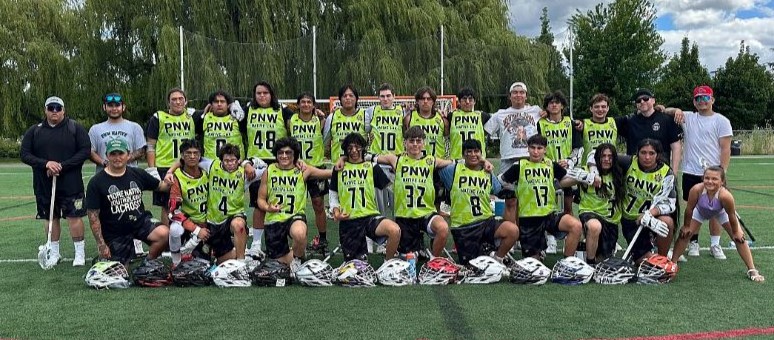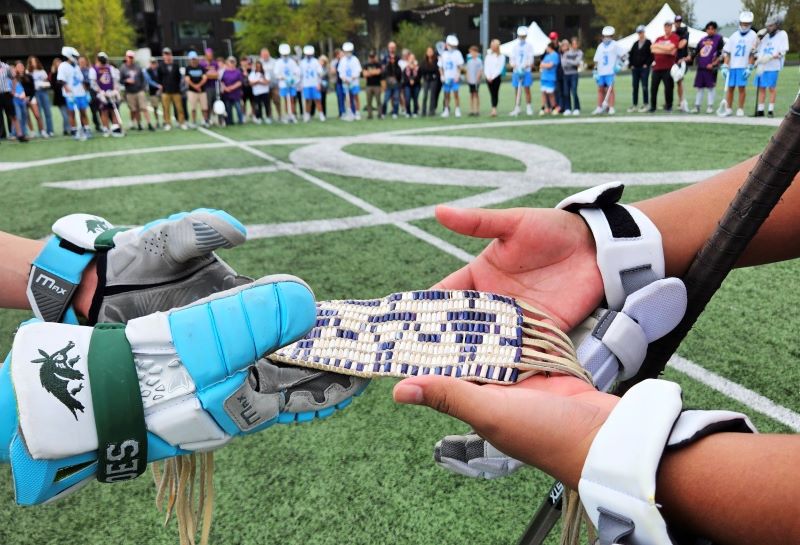It’s no secret that the history of lacrosse is quite unique and features a deep spiritual connection to Native American culture. Natives believe that lacrosse was gifted to them by the Creator, with purposes that extend beyond just fun and recreation.
Unfortunately, through the decades, the understanding of that connection to ‘The Medicine Game’ has increasingly been lost among the new generations of players gravitating to lacrosse. And ironically, in some places, it’s also growing fainter within the very community that considers the traditions to be most special – Native Americans.
JD Elquist, an Alaska Native (Sugpiaq/Alutiiq) now based in Tacoma, Washington, is on a mission to rekindle the game’s cultural connection to Native youth in the Pacific Northwest.
“Lacrosse, while growing and expanding worldwide, has drifted from its cultural roots,” said Elquist, who has launched Pacific Northwest Native Lacrosse (PNWNL) to remind players and the wider community of lacrosse’s origins.
“I want our club to serve as a beacon, rekindling the cultural connection that many Native youths have been missing,” he said.
As a resident of the region for over 20 years, Elquist understands the PNW’s rich Native American history and culture, and wants to do what he can to preserve lacrosse’s roots within that narrative.
“The club stands not just as a sports organization, but as a vital cultural bridge, reconnecting Native youth with a significant part of Native American heritage,” he said.
Elquist, 37, began his involvement with lacrosse as a freshman player in high school, and his connection to the game has grown stronger through the years as he has come to understand it roots and origins more deeply. He remains active as a player and coach, most recently serving with the men’s club at the University of Puget Sound.
“It’s been a personal journey for me, helping me to grow in my own culture and to better understand who I am,” Elquist said. “I fell in love with lacrosse because it’s the Creator’s Game.”
Elquist’s goal now is to increase Native youth participation while also helping those players to gain a deeper understanding of their unique heritage.
The growth strategy includes hosting introductory player clinics in Tribal communities, developing competitive travel teams for regional and national tournaments, and partnering with schools and community organizations on advocacy efforts to further promote lacrosse.
A local stick-drive supported by USA Lacrosse provided needed equipment for the initial clinics, and financial assistance through partnerships is providing Elquist with additional resources as the club begins to gain traction.
One of the PNWNL’s supporters is the 4 The Future Foundation, the organization created by the Thompson brothers to inspire the next generation of players.
“When the game was gifted to us, the Native American people, there were instructions with it,” says Lyle Thompson, a two-time Tewaaraton Award winner and arguably the most celebrated Native player of the past two decades. “There was a way it is supposed to be played. We’re slowly going down a different path and not using those instructions, but they are still there. And the game is still here to teach us those instructions.”
The PNWNL’s inaugural travel squad, a U17 boys’ team that played in the Northwest Summer Open in Portland earlier this summer, set a high bar for future teams, advancing to the tournament’s championship game and finishing as the runner-up. Their accomplishment was even more noteworthy in light of the fact that the assembled squad had just one on-field practice together prior to the start of the event.
“While the journey to form this team began months ago as we worked to identify and recruit players from various tribal communities, the team came together primarily through Zoom meetings and phone calls with parents and players,” Elquist said. “This collaborative effort underscores the dedication and commitment of everyone involved in making this dream a reality.”
Equally significant for Elquist, this groundbreaking team was comprised of 19 players and six coaches representing 24 different tribal nations. That unity was a crowning achievement that sets a firm foundation for the club’s future.
Dano Underwood, one of the team’s parents who also serves as cultural leader of PNW Native Lacrosse, captured the essence of the team's spirit. “When you pass the ball amongst each other, you pass the ball among Nations,” he said.
Rick Roy, who had three of his sons playing on the U17 team, understands Elquist’s vision as well as anyone. As a high school and club coach in Burns, Oregon, half of the players Roy coaches every year are members of the local Paiute tribe, and integrating their Native culture is a major component of his coaching philosophy.
One tradition that Roy employs before each home game is the passing of the Wampum Belt among the teams during pregame as a gesture of welcome and friendship.
“We are very focused on the spiritual side of the game and in promoting the history and origins of lacrosse,” said Roy, who also serves on USA Lacrosse’s Native American Advisory Council. “It’s very much a part of everything we do.”
Roy is encouraged by Elquist’s similar commitment to growing the game among Native youth, and in expanding the deeper understanding of lacrosse among both Native and non-Native communities.
“There is a lack of understanding within the contemporary lacrosse community about what lacrosse really is,” Roy said. “This game is way more than X’s and O’s, or wins and losses. So much understanding and appreciation of the true culture has been lost.”
Elquist is proud of the U17 team’s achievement in its first tournament outing, but keeps the PNWNL’s larger vision in the forefront.
“The tournament was not just about on-field success, it was a celebration of what it means to be a Native lacrosse player, honoring the Medicine Game, and giving thanks to the Creator,” he said.
The club’s newest travel squad, a U13 boys’ team, will be playing its first tournament in September at the BC Sixes event in Canada.
Elquist has conducted four camps and clinics in recent weeks, including one in Colville, located in the northeast corner of Washington state, that attracted about 70 participants. He has been encouraged by the level of enthusiasm and interest by the Native youth boys and girls.
“We’re trying to build relationships across this region,” said Elquist, who also has a full-time job in economic development for the Downtown Tacoma Partnership. “Yes, this is a lot of work, and there are some hurdles, but the cultural component is so very important. We want all cultures represented, and we want kids to be really connected to their cultures.”


